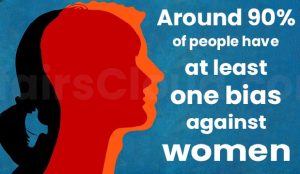14-06-2023
UNITED NATIONS: A new report from the United Nations (UN) has highlighted the prevalence of “fundamental biases” against women, signaling a “decade of stagnation” in women’s rights across various parts of the world.
 According to the United Nations Development Program (UNDP) report released on Monday, nearly nine out of ten individuals hold biased views against women. The study draws on the latest data from the World Values Survey, revealing that half of the global population still believes men make better political leaders, over 40% believe men are superior business executives, and 25% consider domestic violence against women justified.
According to the United Nations Development Program (UNDP) report released on Monday, nearly nine out of ten individuals hold biased views against women. The study draws on the latest data from the World Values Survey, revealing that half of the global population still believes men make better political leaders, over 40% believe men are superior business executives, and 25% consider domestic violence against women justified.
The authors of the report emphasize that biased gender social norms present a significant obstacle to achieving gender equality. These biases persist across regions, income levels, development stages, and cultures. The UNDP’s Gender Inequality Index (GII), a composite measure of gender inequality, has remained stagnant since 2019, indicating that progress toward gender equality by 2030 is unlikely.
These biases manifest in various ways, including the underrepresentation of women in leadership positions. In the labor market, women hold less than one-third of managerial roles, while at the highest level of leadership, only  around 10% of heads of state or government are women. Notably, these disparities do not align with educational attainment. Despite women being more highly educated than men in 59 countries, the average gender income gap remains at 39% in favor of men.
around 10% of heads of state or government are women. Notably, these disparities do not align with educational attainment. Despite women being more highly educated than men in 59 countries, the average gender income gap remains at 39% in favor of men.
The global backlash against women’s rights, coupled with the wide-reaching impact of the COVID-19 pandemic, has further exacerbated the issue. The report highlights that social norms impeding women’s rights have adverse effects on overall societal development. Pedro Conceicao, the head of UNDP’s Human Development Report Office, underlines the importance of achieving freedom and agency for women, as it benefits everyone.
While the situation appears grim, the report’s authors emphasize the potential for change. They cite examples of parental leave policies challenging perceptions around caring responsibilities and labor market reforms transforming beliefs about women in the workplace. Governments play a crucial role in shifting gender social norms, according to the authors. Recognizing the economic value of unpaid care work is identified as a significant starting point in challenging existing gender norms. (Int’l Monitoring Desk)
 Pressmediaofindia
Pressmediaofindia




